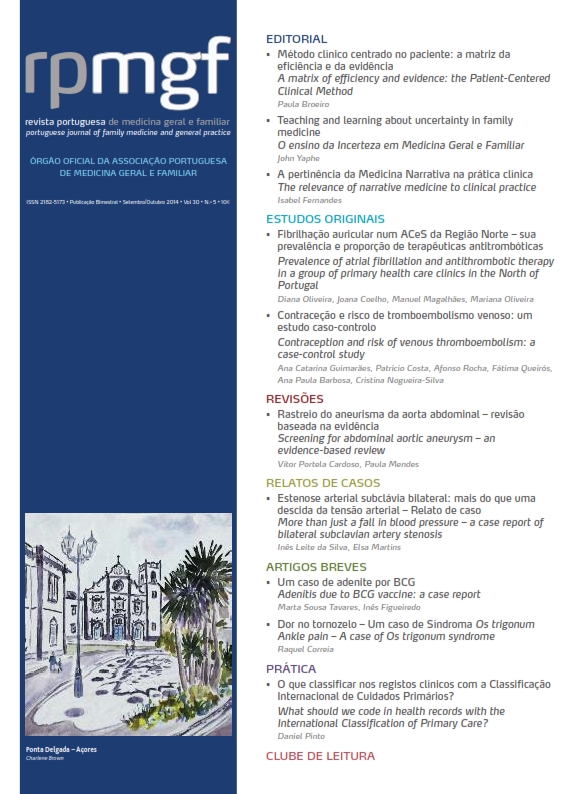Screening for abdominal aortic aneurysm – an evidence-based review
DOI:
https://doi.org/10.32385/rpmgf.v30i5.11387Keywords:
Abdominal Aortic Aneurysm, Mass Screening, Mortality, Side EffectsAbstract
Objective: Review the evidence of mortality and adverse effects of screening for abdominal aortic aneurysm (AAA) in asymptomatic adults. Data Sources: National Guideline Clearinghouse, Guidelines Finder, Canadian Medical Association Practice Guidelines, Cochrane, DARE, Bandolier, MEDLINE and Index of Portuguese Medical Journals. Methods: We conducted a search for meta-analyses (MA), systematic reviews (SR), randomized clinical trials (RCT) and clinical practice guidelines (CPG), published between 01/01/2003 and 03/23/2013 in the Portuguese, Spanish, English and French languages, using the MeSH terms abdominal aortic aneurysm and mass screening. We used the Oxford Centre for Evidence-Based Medicine (CEBM) scale for assessment of levels of evidence (LE). Results: Of 337 articles obtained, 10 met the inclusion criteria (2 MA, 1 SR and 7 CPG). The SR and the MA selected showed that screening for AAA significantly decreased mortality in men aged between 65-75 years old, but not in women. A reduction in all-cause mortality was observed in one MA, which estimated a number needed to screen of 156. This is lower than the number needed to screen in current cancer screening programs. Screening doubled the number of elective surgeries and decreased the number of emergency surgeries for ruptured AAA by half. Conclusions: Consistent, good quality evidence demonstrated a reduction in mortality from AAA by screening asymptomatic men aged >= 65 years (LE1). The treatment of AAA is associated with significant risk of death and surgical complications, which may be acceptable in individuals at high risk.Downloads
Downloads
Published
Issue
Section
License
The authors will assign to the RPMGF the sole right to publish and distribute the content of the manuscript specified in this declaration via physical, electronic, broadcasting or any other medium that may come into existence. They also grant the RPMGF the right to use and exploit this manuscript, in particular by assigning, selling or licensing its content. This permission is permanent and takes effect from the moment the manuscript is submitted, has the maximum duration allowed by applicable Portuguese or international law and is of worldwide scope. The authors further declare that this assignment is made free of charge. If the RPMGF informs the authors that it is not going to publish their manuscript, the exclusive assignment of rights ceases forthwith.
The authors authorise the RPMGF (or any entity it may appoint) to act on their behalf when it believes that copyright may have been infringed.





